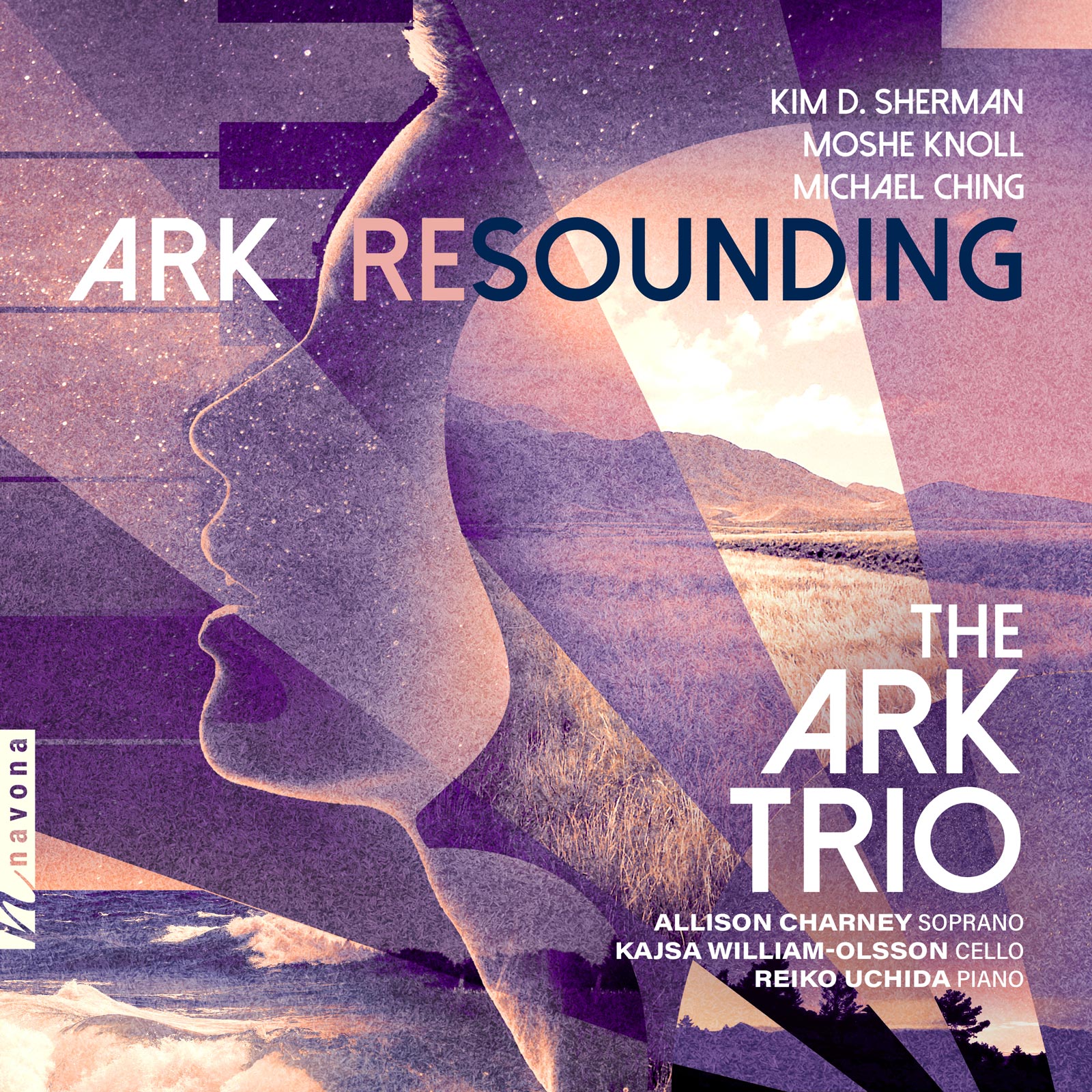ARK Resounding
Kim D. Sherman composer
Moshe Knoll composer
Michael Ching composer
The ARK Trio
Allison Charney soprano
Kajsa William-Olsson cello
Reiko Uchida piano
Non-standard setups in classical music may be interesting, but they are commonly faced with the problem of limited repertoire. The ARK Trio, formed by soprano Allison Charney, cellist Kajsa William-Olsson, and pianist Reiko Uchida, has found a way of circumventing this challenge by commissioning works from contemporary composers as well as re-arranging classics, and the result can be heard on their debut release, ARK RESOUNDING. The pieces presented here may be an eclectic mix of American history, Bachian and Schubertian influences, and timeless poetry, but they are all united by one common denominator: the bittersweet trials and tribulations of love.
Listen
Stream/Buy
Choose your platform
Track Listing & Credits
| # | Title | Composer | Performer | |
|---|---|---|---|---|
| 01 | Prairie Diary: Prairie Dawn | Kim D. Sherman | The ARK Trio | Allison Charney, soprano; Kajsa William-Olsson, cello; Reiko Uchida, piano | 1:52 |
| 02 | Prairie Diary: Recipe | Kim D. Sherman | The ARK Trio | Allison Charney, soprano; Kajsa William-Olsson, cello; Reiko Uchida, piano | 0:49 |
| 03 | Prairie Diary: No Rain | Kim D. Sherman | The ARK Trio | Allison Charney, soprano; Kajsa William-Olsson, cello; Reiko Uchida, piano | 1:12 |
| 04 | Prairie Diary: Still Alive | Kim D. Sherman | The ARK Trio | Allison Charney, soprano; Kajsa William-Olsson, cello; Reiko Uchida, piano | 1:15 |
| 05 | Prairie Diary: Transformation Song | Kim D. Sherman | The ARK Trio | Allison Charney, soprano; Kajsa William-Olsson, cello; Reiko Uchida, piano | 2:07 |
| 06 | Prairie Diary: Bobby Shafto | Kim D. Sherman | The ARK Trio | Allison Charney, soprano; Kajsa William-Olsson, cello; Reiko Uchida, piano | 1:35 |
| 07 | Prairie Diary: I Call Your Name | Kim D. Sherman | The ARK Trio | Allison Charney, soprano; Kajsa William-Olsson, cello; Reiko Uchida, piano | 3:02 |
| 08 | Prairie Diary: Evening Song | Kim D. Sherman | The ARK Trio | Allison Charney, soprano; Kajsa William-Olsson, cello; Reiko Uchida, piano | 2:38 |
| 09 | Simplicity (A Cantata for Soprano, Violoncello and Piano) |
Moshe Knoll | The ARK Trio | Allison Charney, soprano; Kajsa William-Olsson, cello; Reiko Uchida, piano | 16:22 |
| 10 | Wedding Song | Kim D. Sherman | The ARK Trio | Allison Charney, soprano; Kajsa William-Olsson, cello; Reiko Uchida, piano | 3:40 |
| 11 | Arrangements and Derangements: Interpretations of Schubert: Die manner sind méchant | Michael Ching | The ARK Trio | Allison Charney, soprano; Kajsa William-Olsson, cello; Reiko Uchida, piano | 2:38 |
| 12 | Arrangements and Derangements: Interpretations of Schubert: Sei mir gegrüsst | Michael Ching | The ARK Trio | Allison Charney, soprano; Kajsa William-Olsson, cello; Reiko Uchida, piano | 4:07 |
| 13 | Arrangements and Derangements: Interpretations of Schubert: DIE Forelle! | Michael Ching | The ARK Trio | Allison Charney, soprano; Kajsa William-Olsson, cello; Reiko Uchida, piano | 2:26 |
| 14 | Arrangements and Derangements: Interpretations of Schubert: Rastlose Liebe | Michael Ching | The ARK Trio | Allison Charney, soprano; Kajsa William-Olsson, cello; Reiko Uchida, piano | 1:24 |
Recorded February 2019 at Mairs Concert Hall, Janet Wallace Fine Arts Center, Macalester College in Minneapolis MN
Producers Kim D. Sherman, Allison Charney
Engineer Reid Kruger
Assistant Audio Engineers Lennon Holden, AJ Dysick, Nadav Skloot, Sam Dornfest, Jacob Parsky, Anna Rotolo
Editing & Mastering Reid Kruger, Waterbury Music and Sound
Presented by PREformances Chamber Music Collaborative
Special Thanks:
Macalester College Music Department
Mark Mandarano
Mark Mazullo
PREformances, Inc.
Executive Producer Bob Lord
A&R Director Brandon MacNeil
VP of Production Jan Košulič
Audio Director Lucas Paquette
VP, Design & Marketing Brett Picknell
Art Director Ryan Harrison
Design Edward A. Fleming, Morgan Hauber
Publicity Patrick Niland, Aidan Curran
Artist Information

The ARK Trio
The ARK Trio was founded by soprano Allison Charney, cellist Kajsa William-Olsson, and pianist Reiko Uchida, all full-time musicians, mothers of school-age children, and dear friends who wanted to collaborate musically. Much to their surprise, they soon learned that their make-up of soprano, cello, and piano is unique in classical music, as evidenced by the paucity of extant compositions available for their combination.

